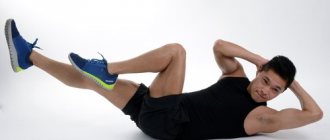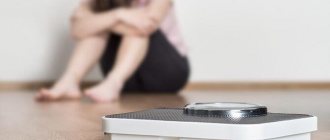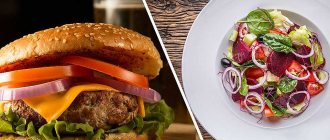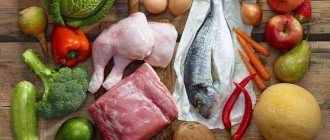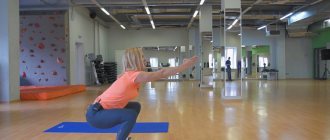Hello!
People who specialize in regular running courses know that eating while running is an integral part of training. It is important to follow the rules of nutrition before and after the lesson in order to have a high effect.
Nutrition when running should be complete and balanced, rich in proteins, carbohydrates, vitamins and minerals. In addition, athletes and long-distance runners often use different protein textures and energy drinks. Keep in mind that the specifics of your diet will depend on what time of day is best to run.
The body itself allows you to know what and when to eat. But it also happens that the desire to eat food immediately after or before running is usually disrupted. This is due to the fact that the diet does not always coincide with the training regimen.
For example, running in the morning can lead to severe lethargy in one day. And running throughout the day on an empty stomach can ruin your motivation. When running in the evening, a typical dinner can move for several hours, making it difficult to fall asleep after eating. Therefore, among other things, it is important to synchronize food and activities.
Why can't you run after eating? Because at least it will be very difficult, often after training you will feel bad. In the process of running, the body needs strength, and this energy is already spent on processing food.
In this embodiment, the food consumed will be ballast, which is stored in fats. Hence the fact that the effectiveness of classes can be greatly affected.
Another question: when is it better to run - before or after eating. It all depends on your diet and working hours. But in both version 1 and 2, it takes time between jogging and eating the right food.
Running on an empty stomach in the morning
A huge mistake is to run in the morning on an empty stomach. The glycogen deposits in the liver are used up overnight and hence it becomes unrealistic to maintain adequate blood glucose levels using this method.
Many people believe that running on an empty stomach will ensure good fat burning - this is not the case. If you don't eat breakfast and don't provide the body with glucose, it will use muscle tissue catabolism rather than fat. Moreover, to cause fat catabolism, the presence of carbohydrates cannot be eliminated - a general law of biochemistry.
Proper nutrition. How long after eating can you exercise without harming your health?
For those who lead an active lifestyle, go in for fitness at sports centers or go for daily jogging, the question often arises: how long after eating can you exercise? After all, it is important not only to get a boost of energy and warm up, but also to do it without causing harm to your health. The load on the heart, joints, and blood vessels during physical exercise is significant, and knowing how to eat properly, you need to get the maximum benefit from such exercises. One of the important factors is proper nutrition.
What can we eat so that the time we spend in the gym is not wasted?
Pros and cons of eating before exercise
Some people mistakenly try to go jogging or do gymnastics without having breakfast; at best, they drink a cup of coffee. The decision is wrong, since it will not bring benefits, but additional problems. The fact that you can burn more calories on an empty stomach is fiction and misconception. Before starting classes, you need to eat a light breakfast about an hour before them.
During this time, the food will be digested, and you can start training in a good mood, full of strength. Exercising after eating is controversial. Some argue that in this way the body relaxes, spends energy on the digestion process and thereby reduces the effectiveness of exercise. So how long after eating can you exercise? How to find the right solution?
Each organism is individual
Many people hate any food in the morning and are content with only a cup of coffee or tea. Some people wake up with a voracious appetite, easily eating a plate or two of borscht for breakfast. It is worth sticking to the golden mean.
As correctly noted, the body needs to wake up and get energy in order to move all day, and therefore a light breakfast is necessary. If you decide to go for a run in the morning, you need to take into account that glycogen reserves have decreased overnight, and therefore you need to eat so that your blood sugar does not drop.
Advice!
But if dinner was high in calories, you can go for a run lightly, on an empty stomach. There will be no feeling of discomfort.
You will feel for yourself how long after eating you can exercise, usually within an hour. It takes some time for the food to be absorbed, as the double load on the body can be a difficult ordeal, especially with regular exercise. You should not eat fatty and high-calorie foods; a snack of non-calorie foods is enough.
Sample menu for a light breakfast
You can offer several options for a healthy and light breakfast.
- Oat or wheat flakes with milk.
- One small banana (you can add low-fat yogurt to it).
- Sandwich made of black bread with lean ham.
- Yogurt with fruit cookies.
- Milkshake with the addition of fresh fruits or berries (can be frozen).
Fluid intake before and during exercise
Water is vital for our body - and there should be enough of it.
Especially when it comes to training, since during this period the body spends especially a lot of energy, so it is necessary to replenish the moisture deficit and quench thirst.
But the question arises not only how long after eating you can exercise, but also how to properly consume liquid in this case, in what quantities and when.
There are no strict rules, nor is there a consensus on this matter. Each instructor has his own point of view, but most agree that before classes you should drink a small amount of liquid, preferably purified water.
This will help remove toxins from the body and cleanse it of toxins. Metabolic processes work well when sweating. And you can drink during training - this is necessary to maintain vitality. There is no way to do without this.
It should also be taken into account that after exercise you should not drink cold water, as there is a high risk of getting sick. It shouldn't be sweet or carbonated. Room temperature liquid is the best option.
If the workout takes more than an hour
In some cases, you have to study not in the morning, but during the day and for quite a long time. There will certainly be breakfast and a full lunch.
If there is enough time before training, then high-calorie foods are also permissible, but they should contain a lot of carbohydrates. Therefore, experts say that you can exercise after eating, when 2-2.5 hours have passed after exercise.
Everything in this case depends on what kind of stress your body will experience - and only this fact should be taken as a starting point.
Attention!
After playing sports, you can eat no earlier than an hour or an hour and a half later, and you should focus on salads, vegetables, and lean meat.
You can exercise after eating if you follow certain rules and listen to your body.
If the period of time between lunch and training is short, then the amount of food should be minimal, and it should be low-calorie. The main thing is not to harm yourself and create a proper training program.
Source: https://fb.ru/article/136465/pravilnoe-pitanie-cherez-skolko-posle-edyi-mojno-zanimatsya-sportom-bez-vreda-dlya-zdorovya
Breakfast
If you've been training for more than six months and are seeking the benefits of certain sports fruits (i.e. you're not running for weight loss rather than for athletic performance enhancement purposes), it's a good idea to start preparing for your awakening.
For reference, this is an adequate protein breakfast consisting of regular food or sports nutrition products. A good amount of protein for breakfast is 0.5 - 0.7 g per kilogram of body weight.

Beta-alanine and arginine are good for training. Together, they improve blood circulation in the muscles and normalize energy metabolism, increasing the threshold of fatigue.
If you are not a professional runner, opt for a high-protein breakfast and also take a vitamin and mineral supplement as standard for antioxidant benefits.
It's time to run!
Warm weather invites you to go outside. It's time to start running.
Many people do this to lose excess weight, but not everyone knows how to turn exhausting sweating into a pleasant and most useful pastime.
The head of the department of sports medicine and sanology at the Kyiv Center for Sports Medicine, Professor Gennady Apanasenko, spoke about how to run so that the exercises bring benefits.
HOW DOES RUNNING IMPACT YOUR HEALTH?
The cardiovascular system
The heart muscle (myocardium) is trained, which is why we acquire the ability to endure heavy physical activity without feeling tired.
Endocrine system
When running, previously dormant capillaries gradually open. This activates the activity of the endocrine glands. As a result, the activity of all body systems becomes more harmonious and balanced.
Nervous system
Running is the best cure for stress. It allows you to remove accumulated negative emotions and use up excess adrenaline that accumulates in the blood during the day. In addition, unlike medicinal tranquilizers, running also stimulates the production of endorphins, which are responsible for high mood and a feeling of joy.
Immunity
When running, the content of immunoglobulins, erythrocytes and lymphocytes—protective immune cells—increases in the blood. It is also known that running is the prevention of tumors.
Metabolism
When running, fat metabolism increases noticeably, resulting in weight loss.
In order for the fat to begin to “melt” and all the above processes to start, you need to run for at least 30 minutes.
RUNNING IS CONTRAINDICATED FOR THOSE WHO HAVE:
1. Congenital heart defects. 2. Previous stroke or myocardial infarction. 3. Heart rhythm disturbances. 4. Circulatory failure or pulmonary failure of any etiology. 5. High arterial hypertension (pressure 180 to 110 and higher). 6. Chronic kidney disease, thyrotoxicosis and diabetes mellitus. 7. Glaucoma and progressive myopia. 8. Any acute illness, including colds, as well as exacerbation of a chronic illness.
If you haven’t been to a doctor for a long time and don’t know what state your health is in, then before classes you need to visit a sports medicine doctor (they are accepted at regional health or sports medicine centers), do a cardiogram, measure your blood pressure and conduct a number of other tests that will tell you how long can you run?
IN THE MORNING OR EVENING?
You can run at any time of the day. In the mornings, when there are increased levels of hormones in the blood, running will be a natural way to discharge excess hormones, which will help the body return to harmony. You can run half an hour after waking up.
If you run after a hard day, you will relieve stress, suppress excess appetite and fall into a wonderful sleep. But you can’t go jogging 2 hours before bedtime.
FULL OR FULL?
If you run in the morning, it is better to do it on an empty stomach, otherwise the body’s main forces will be spent on digesting food, and there will be little energy left for running. If you have already eaten, then you can run after that no earlier than 2 hours after eating. This is how long it takes for food to be digested.
BEFORE
If you come to the stadium and immediately start running, a beginner will feel discomfort at the beginning of the run - your breathing will be shortened, your heart will pound, and you will quickly get tired. To overcome this quickly, you need to warm up for 5-10 minutes before running.
Warming up allows you to increase the temperature in your muscles and tissues. Warm muscles and joints are more flexible and therefore less susceptible to damage. Warming up also helps redistribute blood in the body. Along with it, nutrients and oxygen are supplied to the muscles, which increases physical endurance.
Running mainly loads the calf muscle and the back of the thigh, so stretch these muscles with small lunges and bends, squats, and warm up the ankle and knee joints with stretching exercises.
In addition to the main muscles, warm up the auxiliary ones - make circular movements with your arms and shoulders, torso and pelvis, bend your torso forward and to the sides, swing your legs and squats, raise your toes.
AND AFTER
At the end of your run, never stop immediately, much less sit down. To cool down and bring your breathing and heart rate back to normal, be sure to walk at a brisk pace for another 2-3 minutes, and then do gymnastic exercises to stretch your muscles, ligaments, joints and tendons. You can drink immediately after running. But never drink soda - the carbon dioxide it contains impairs the removal of toxins and adds stress to the heart and respiratory center.
You can eat in an hour - during this time the body will undergo a change from “adrenaline” regulation to calm, “digestive” regulation.
RUNNING TECHNIQUE
After completing the warm-up, walk for 2-3 minutes at an accelerated pace, getting ready for the upcoming run. And - forward! Start with 200–300-meter runs, do not force the load, even if you feel strong enough to run a marathon. It may happen that the next day, a rapid heartbeat and pain in the knee joint will not allow you to get out of bed. It’s always difficult to run for the first 10-15 minutes; you feel tight. Choose a pace at which you can breathe calmly through your nose without opening your mouth. If you feel like taking a breath through your mouth, take a step, restore your breathing, and you can continue running. To relax, just make sure that the spinal column is tense, straight as a stick. Everything else should be “put on” it easily and dangle freely. Let your arms dangle like whips. Then relax your facial muscles, then your buttocks and legs from hip to shin. Avoid unnecessary movements of the head, torso and arms - this is a waste of energy. According to Porfiry Ivanov, the gaze is of enormous importance while running. If you look at the ground in front of you, it will be difficult to run. If you look slightly above the horizon, you gradually get the feeling that you are floating in the air, slowly rising up. If you endure the first 15 minutes, then you will get a “second wind” of shortness of breath, fatigue will disappear, running will become easy, your mood will improve, and your heart rate will begin to decrease. Keep this pace further, do not increase the load, it is in this slow run on the second wind that its therapeutic effect lies.
On topic: How to run correctly
The optimal duration of a run should be 45-60 minutes.
IF CREPATURE APPEARS
As a rule, muscle pain appears on the second day - sore throat. The soreness is caused by the accumulation of lactic acid in the muscles, as well as possible micro-tears of the fibers. This is not dangerous, the pain will go away on its own. To make it go away faster, visit the sauna (at worst, take a hot bath) or ask for a massage.
Source: https://www.segodnya.ua/life/health/pora-bezhat.html
The importance of carbohydrates
An hour and a half before the start of training, all groups of runners are recommended to consume foods high in carbohydrates. But with a significant caveat - ordinary carbohydrates will not have the desired effect, but can cause harm.
So, one option is to make your own mixture of juice, water and sweeteners (if you used to have real food) or consume foods loaded with carbohydrates.

Chocolate and chocolate bars (including those from the “sports nutrition” series), sweet dried fruits, honey, macaroni and pasta, sweet rice pilaf, rich molasses, yogurt with rice balls - all this will provide an energy boost.
Eating before running
If you are a long-distance runner, it is important for you to eat a full meal three to four hours before your race ().
Distance running includes events such as 10 km, half marathon (21 km) and marathon (42 km).
If you run for less than 60-90 minutes, a full meal beforehand becomes less important ().
Having a full meal beforehand serves two purposes. One is to keep you from feeling hungry before and during your run, and the other is to maintain optimal blood sugar levels for the working muscles.
Foods should be high in carbohydrates, moderate in protein, and low in nutrients that slow digestion, such as fat and fiber.
Be sure to drink 500-590 ml of water along with meals to provide the body with enough fluid ().
So, what to eat before long-distance running:
- Five boiled egg whites and one whole egg with two slices of white bread with jelly and banana.
- One 225 gram serving of low-fat cottage cheese with 150 grams of blueberries and one slice of white bread with one tablespoon of honey.
- One medium white burger bun with two slices of turkey and mustard (if desired) + 30 grapes.
- One medium-sized baked potato with sour cream and 85 grams of chicken breast with bread.
- One 200 gram serving of cooked pasta with 130 grams of Marinara sauce with 85 grams of chicken breast and a slice of buttered bread.
Foods to avoid:
- High-fat foods : Fatty sauces and creams, fried foods, or foods cooked with a lot of fat or oil.
- High-fiber foods : High-fiber whole grains, legumes and cruciferous vegetables such as broccoli and cauliflower.
Conclusion:
3-4 hours before a race or workout, long-distance runners should consume food that is easily digested and absorbed by the body. An ideal pre-run meal should be high in carbohydrates, moderate in protein, and low in fat and fiber.
Restrictions before training
If the goal of running is weight loss, the last meal should be no later than 1.5 hours before training.
From meals before running, you should exclude dishes made from grains and legumes, potatoes, eggplants, cabbage, mushrooms, radishes and spinach. Eating fatty meat (including barbecue) and fried foods is not allowed.
To avoid overloading the kidneys, blood vessels and heart muscle, water intake should be limited before exercise.

Winner or sweet tea, low-carb energy drinks, but not sparkling water, caffeinated drinks or flavored "soda" are ideal options. Drink a large volume of water 30 minutes before classes; it is inappropriate to exceed 200 ml.
Sportspit
Sports nutrition, offered by many companies, is a definite convenience for runners. First of all, this is a significant saving of time, which is spent on selecting and purchasing the necessary goods, manufacturing them, and checking compatibility.
The second convenience is the ability to choose one or more products that will provide the necessary set of nutrients at this stage of preparing a lesson or, in particular, during a run.

Factors
There is no clear answer to the question of how long you can run after eating. You can exercise almost immediately after a meal if you do not feel any discomfort in your stomach and feel great. The length of time you need to wait before going for a run depends on the following factors:
- Amount of food eaten;
- Type of food;
- The presence of discomfort in the digestive tract (bloating, heartburn or belching, etc.).
If you overeat heavily, for example, it will be problematic to train, even 5 hours after the meal. Try to understand for yourself how long you can run after eating experimentally. Vary the time, volume, and type of food you eat before exercise. By trying different options, you can find the most optimal one for yourself.
Nutrition while running
It is worth noting that nutrition while running is mainly necessary only for those athletes who cover a distance of several kilometers. If the run is easy and lasts no more than 1.5 hours, then you cannot fuel your body with additional energy during the session.
It is recommended that you recover at any time throughout the exercise. For these purposes, approximately 60 grams of carbohydrates are suitable, which is approximately 250 kcal. Food can be water or solid. Waters include a variety of sports drinks, gels and other nutrients. Some athletes practice drinking by preparing a follow-up drink:
Take baby puree and mix it with a little water to create a good energy solution to fuel your meal.
For solid foods during your run, you can eat fruit, especially bananas, sports or chocolate bars, and light cakes such as oatmeal. With all the products you have to carry, runners often prefer something small and bite-sized, like gels or bars.
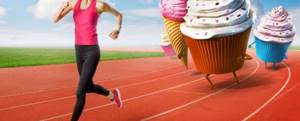
It is important that nothing gets in the way or causes discomfort while running, so you should take a moderate amount of food with you, which can simply be placed in your pockets or belt in a special running bag.
For those who exercise a little, meals during the run may only include one drink. Sweet tea, fresh fruit juice, or at least a sports shake may be suitable for this.
On hot days, you can drink mineral water without minerals to prevent dehydration in the sun. Also, don't forget about cold water when you don't seem to be drinking, but you should still be feeding your body with extra energy.
Cheat sheet: what to eat before a run
Um, just a moment. If you are on Telegram, then you definitely hear - definitely! — you should go to the Nogibogi channel. This is a runner's oasis - with tips, motivational stories and interesting facts.
We figured out how to eat before a run so that you can run easily and without any digestive problems. Spoiler alert: there won't be a one-size-fits-all recipe, but our recommendations will help you determine what's right (or not) for you.
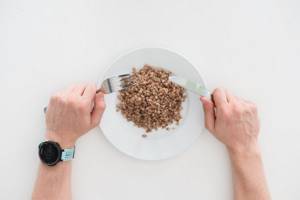
Determining the optimal time to eat
First you need to understand how long before the start of a run you can eat without consequences in the form of heaviness in the stomach and other unpleasant sensations. The intensity of food digestion is different for everyone: for some it takes 30-60 minutes (lucky people!), for others you have to wait 2-3 hours before taking the first step out the door.
How to find your optimal “window”? Experimentally, in practice. Try eating a medium-sized portion 90 minutes before your run. If the workout was completed without stomach discomfort, try moving your meal 15–20 minutes closer next time.
Likewise, if you're having digestive issues while running, try eating 15 to 20 minutes later. So, by moving at intervals of 15 minutes, you can determine the specific time that suits your body.
Determining calorie needs for different types of running workouts
Runners have a bit of a tendency to exaggerate their caloric intake: “Well, I worked out and honestly worked through that big bowl of pasta.”
The average 70kg athlete burns only 500-600 calories in 60 minutes of running, depending on pace and effort level. Plus, the muscles already have enough fuel (glycogen), which is enough for 2 hours of their work. For a more accurate calculation, you can use this calorie calculator.
This means that on normal light running days, having a small snack 30 to 90 minutes before your workout will be enough to keep you from feeling hungry and to raise your blood sugar levels a little.
If you prefer to run in the morning, the glycogen reserve in your muscles will be slightly less (after all, at least 6–8 hours have passed since dinner). But unless you're planning a long run or intense tempo workout, you still don't need to worry about running out of calories.
Making a “black list” of products
You will have to select, as usual, empirically. But there are general criteria that a running snack must meet:
- low fat content
- low fiber content
- low protein content
- high carbohydrate content
Protein and fat slow down the digestion process. This helps you feel full for a long time after eating, but is not the best choice before a workout - you need foods that are easy to digest.
Eating too much fat or protein before a run can cause side pain, nausea, and a feeling of heaviness. Foods high in fiber can sometimes cause cramps and flatulence.
It’s also better to drink your favorite cup of coffee after a run: drinks with a high caffeine content can cause rapid heartbeat, abdominal pain and frequent urge to go to the toilet.
Products that are best avoided before running:
- legumes
- broccoli, artichokes and other high fiber vegetables
- apples, pears and other high fiber fruits
- caffeine (in large quantities)
- cheese, cottage cheese, red meat, bacon and other high protein foods
- spicy food
- dairy products - kefir, yogurt, milk, ice cream
Choosing the right carbohydrate snack option
High carbohydrate foods are the best choice before a run. From carbohydrates, the body obtains glucose, the main source of energy during exercise. Glucose circulates in the bloodstream, where it can be used for immediate energy or stored as readily available glycogen in the muscles and liver.
Whenever possible, choose natural products, save sports gels for competitions.
Here are the most popular running snack options.
Before a morning run of moderate intensity and duration:
- banana
- dates
- some sweet tea with cookies
- granola bar
Before tempo or interval training:
- toast with jam or peanut butter and banana
- oatmeal with jam
- pancakes/waffles with jam
Before a long workout:
- pasta
- sweet potato
- oatmeal with banana and dried fruits
- cereals - buckwheat, rice, quinoa with a small amount of vegetables
These same foods would be a suitable dinner if you have a long workout in the morning.
Before the competition
The main rule is not to eat foods that you have not tried before and the reaction of the stomach to which is unknown.
For many amateur runners, the most popular meal before a race is oatmeal with jam.
Important: dinner before the race should also be light. Eating too much fatty or spicy food the night before can have a negative impact on your sleep quality and cause stomach cramps when you run. And too salty foods will contribute to faster dehydration.
Don't forget about hydration
Of course, you shouldn’t drink deciliters of water immediately before a run, but you don’t need to completely give up drinking. You can drink 200 ml of liquid 30–40 minutes before training. The most suitable options are still mineral water, sweet tea or a sports drink.
What else to read:
- Five healthy sources of carbohydrates for anyone who exercises
- How much water should you drink? What about while running?
- Unashamed Questions and Answers About Running Tummy Troubles
- 30 Mistakes Runners Make Over and Over Again
Nutrition after running
Post-workout nutrition is provided to restore carbohydrate deposits in the body. This is due to the fact that within an hour after running, the body tries to restore the supply of a substance such as glycogen. This substance is lost during running exercises.
Immediately after finishing the run, eating is strictly prohibited, since the activity of the digestive system is significantly reduced. To reduce hunger and thirst, you need to drink about 300 ml of natural juice. Such ideal nectars are: apple, tomato and orange.
Half an hour after running, you can start eating. It is best if it is oatmeal, semolina or honey wheat, because it contains an impeccable ratio of proteins and carbohydrates.
For runners who prefer sports nutrition, it is recommended to replace juice with a complex containing amino acids. This will help you get rid of thirst and restore the right amount of carbohydrate reserves in your body.
After half an hour, you need to drink 0.5 liters of the antioxidant complex. This will help restore muscle activity. An hour after finishing your run, it’s time to replenish your body with carbohydrates and proteins. To do this, you can eat bars, dry consistency or protein shakes.
In this case, if you run in the evening, make sure you eat dinner one and a half to two hours before your run. You should exclude from your own diet:
- fried food;
- grains and legumes;
- fat meat;
- flour products.
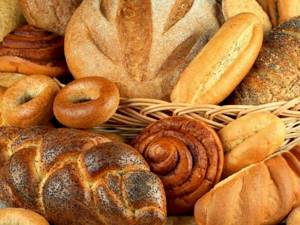
After an evening run, it is recommended to resume the hourly supply of carbohydrates, as in the morning. If the feeling of hunger does not leave you, after a while you can allow yourself fruit or juice, but in moderation.
Make sure you remember that food distribution during your run is not only the key to successful exercise, but also highly beneficial to the body. Unfortunately, not every person who plays sports understands how much harm it can cause to health if you eat incorrectly.
Sports nutrition scheme
A comprehensive sports nutrition diet includes mandatory and optional dietary supplements. They allow you to quickly get rid of extra pounds and strengthen muscles.
It is recommended to adhere to the following scheme:
- Fat burners. Increases calorie absorption and training effect. Reception begins with 2 capsules per day and is gradually increased to 4. You can take up to 8 weeks. Then you need to take a break.
- L-carnitine. Compensates for fatigue and increases endurance. Removes fat from the bloodstream, turning it into useful energy. Take 1-2 times a day, on an empty stomach.
- BCAA - amino acids that prevent dehydration, preserve muscle mass and suppress appetite while maintaining endurance. Take 2 tablets before training or immediately after.
- Protein mixtures. They contain slow protein, which prevents the body from replenishing calories from muscles. Can be taken 3-4 times a day before training or when there is a strong feeling of hunger.
- Vitamin and mineral supplements. When losing weight, there is a deficiency of nutrients, because a limited range of products is consumed. Supplements that relate to sports nutrition take into account the body’s increased need for vitamins and minerals after physical activity. 1 capsule per day is enough.
Nutrition for weight loss
It is broken down into pre-run nutrition and post-run nutrition and is an integral part of any training program.
The day you run, have a protein breakfast. These can be light snacks based on chicken eggs (fried eggs, scrambled eggs, boiled eggs), dairy products (low-fat yogurt, kestrel, cow cheese).
Instead of everyday products, you can use specially prepared sports nutrition. Here's how to calculate your pre-run breakfast nutrient intake: About 0.6 grams of protein per runner's kilogram of weight. Vitamins and minerals are also essential, especially those with antioxidant effects.

The lesson should begin at least an hour and a half before meals. At the same time, you need products that provide carbohydrates, not simple ones, but complex ones. Rice, pasta, even muffins, honey and chocolate are not only not contraindicated during this period, but are also recommended as they can provide you with enough energy to run. But vegetables and mushrooms should be excluded from the diet. So do fried and fatty foods.
After a run, you need to restore your body's carbohydrate reserves. But for the first half hour after the course, do not eat anything, even if they are very desirable. You can drink a glass of juice, it is not prohibited.
After 30 minutes, it is advisable to eat well. Based on your weight, calculate how many carbohydrates and proteins you need to digest. Carbohydrates are sufficient at about one gram per kilogram of weight and 25-30 grams of protein.
Porridge in milk (semolina, rice, oats, wheat) is perfect, if you want - with honey or dried fruits. You can eat pasta or potatoes with meat - these foods will simply saturate your body.
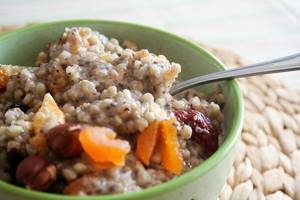
It would seem: why take carbohydrates after exercise, because they will give you weight gain? It turns out that about an hour and a half after a good workout, the body intensively restores glycogen reserves consumed during jogging.
If you do not give him carbohydrates at this time, it is possible to disrupt the metabolism of substances or renew glycogen at the expense of proteins. And this will reduce the body’s resistance and cancel the acquired effect of training.
It is clear that during a run, especially a strenuous one, a lot of water is lost. However, hydration regimen aims to limit the amount of water you drink before running. This will help protect the heart, kidneys and blood vessels from overload. Half an hour before the course you should not drink more than 200 ml of water. This could be a light energy drink or sweet tea, but not soda or coffee.
Light snack before running
A pre-run snack, consumed 30-60 minutes before your run, provides your body with quick fuel.
A light snack is essential if you intend to run for more than 60 minutes, but is also great at lower levels.
It serves the same purpose as a full meal, controlling hunger and ensuring optimal blood sugar levels.
A pre-meal snack consists primarily of carbohydrates and contains far fewer calories than a full meal.
Stick to low-food snacks, as exercising with too much food in your stomach can lead to indigestion, nausea, and vomiting ().
What are the best pre-run snacks to eat:
- Pieces of fruit such as banana or orange.
- Half a sports energy bar.
- Half a bun with honey or jelly.
- 15 crackers, such as saltines or pretzels.
- 25 grams of breakfast cereals.
In addition to your pre-light snack, drink 150-295 ml of water to keep your body well hydrated (, ).
Limit your intake to the same foods you would eat in your pre-run meal, including foods high in fat and fiber.
You may also want to avoid dairy products, especially if you don't know how well you can tolerate them. Dairy products are made from milk and contain the sugar lactose.
In some people, consuming too much lactose can cause bloating, gas, or diarrhea (,).
Foods high in lactose include milk, cheese, butter or cream. Yogurt is also a dairy product, but it is better tolerated because it contains less lactose (, ,).
Conclusion:
A pre-run snack should consist primarily of easily digestible carbohydrates, such as fruit or crackers. If you do not tolerate dairy products well, you should avoid consuming them before running.

